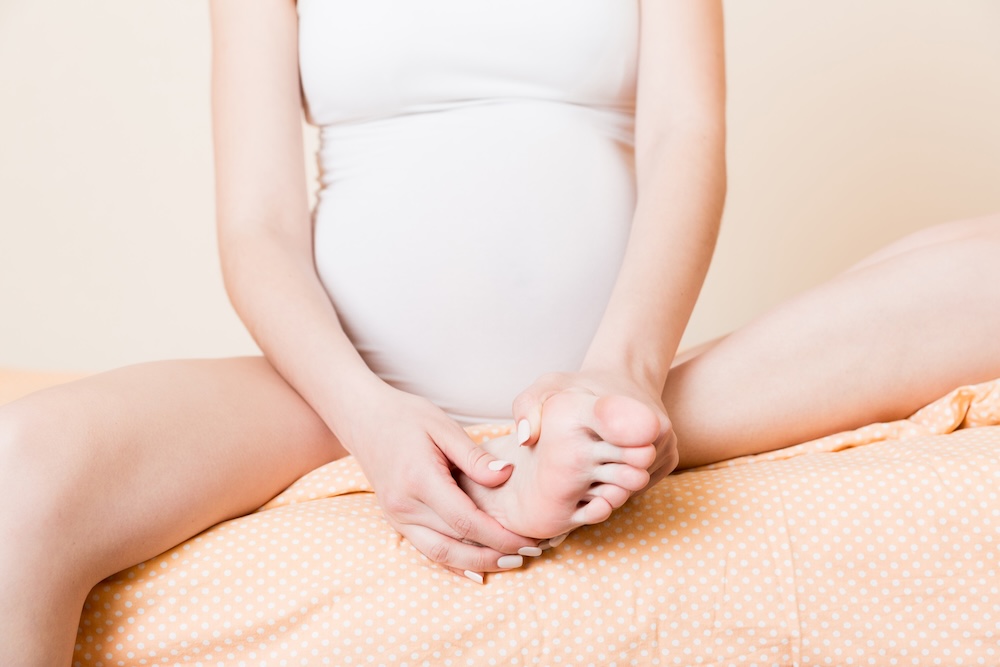Pregnancy is a beautiful and transformative journey, but it can also bring along a variety of physical changes. While most expecting mothers are prepared for common symptoms like morning sickness or fatigue, many are surprised by the impact pregnancy can have on their foot health. From swollen feet to developing conditions like plantar fasciitis and flat feet, pregnancy can cause significant changes that affect mobility and comfort. In this article, we’ll explore how pregnancy affects foot health and provide tips on managing these changes for a smoother and more comfortable pregnancy experience.
1. Swollen Feet and Ankles: The Pregnancy “Cankles”
One of the most common foot-related complaints during pregnancy is swollen feet and ankles, often referred to as “cankles.” This swelling, or edema, occurs when the body retains excess fluid, particularly in the later stages of pregnancy. The weight of the growing baby, combined with hormonal changes and pressure from the uterus, can restrict blood flow and cause fluid buildup in the lower extremities.
Why It Happens:
- Hormonal changes: Increased levels of hormones like progesterone cause the blood vessels to relax, leading to fluid retention.
- Increased blood volume: During pregnancy, the body produces more blood to support the baby, which can contribute to swelling.
- Pressure from the uterus: As the baby grows, the expanding uterus can place pressure on blood vessels in the pelvis, limiting circulation and causing swelling in the feet and ankles.
Managing Swelling:
- Elevate your feet: Whenever possible, elevate your feet above the level of your heart to encourage fluid drainage and reduce swelling.
- Stay hydrated: Drinking plenty of water helps reduce fluid retention and improves circulation.
- Wear comfortable shoes: Opt for shoes with plenty of room to accommodate swollen feet, and avoid high heels or tight footwear that can worsen swelling.
- Compression socks: Wearing compression stockings or socks can help support blood flow and reduce swelling, especially if you’re on your feet for long periods.
Helpful Resource:
2. Plantar Fasciitis: The Painful Condition of the Heel
Another common foot problem that can arise during pregnancy is plantar fasciitis, a condition that causes pain and inflammation in the tissue that runs along the bottom of the foot (the plantar fascia). This is often felt as a sharp pain in the heel, especially with the first steps in the morning.
Why It Happens:
- Increased weight: As pregnancy progresses, the extra weight places additional pressure on the feet, which can cause the plantar fascia to overstretch and become inflamed.
- Changes in gait: The shift in posture and changes to the way women walk due to their growing belly can put additional strain on the feet, particularly on the heel area.
- Hormonal changes: The hormone relaxin, which loosens the ligaments in preparation for childbirth, can also affect the stability of the foot, making the plantar fascia more vulnerable to injury.
Managing Plantar Fasciitis:
- Stretch your feet and calves: Regularly stretching the calves and feet can help relieve tension in the plantar fascia and reduce pain.
- Supportive footwear: Avoid flat shoes or sandals with little support. Opt for shoes with a cushioned sole and arch support to reduce strain on your feet.
- Rest: Give your feet time to rest, especially if you have been standing or walking for extended periods.
- Ice: Applying ice to the affected area can help reduce inflammation and pain.
- Physical therapy: A podiatrist or physical therapist may recommend exercises to stretch and strengthen the feet and lower legs to alleviate symptoms.
Helpful Resource:
- https://www.coolspringsfamilychiropractic.com/how-to-soothe-plantar-fasciitis-pain-during-pregnancy/
3. Flat Feet: The Role of Relaxin and Pregnancy
Flat feet, or fallen arches, are another common issue that many women experience during pregnancy. The arch of the foot may flatten out due to hormonal changes, weight gain, and altered posture. This can lead to foot pain, especially in the later stages of pregnancy.
Why It Happens:
- Relaxin hormone: Relaxin, the hormone that helps prepare the body for childbirth, not only loosens the pelvic ligaments but can also affect the ligaments in the feet, contributing to a flattening of the arches.
- Increased weight: The additional weight of pregnancy puts extra pressure on the feet, which can cause the arch to collapse over time.
- Postural changes: As your center of gravity shifts during pregnancy, it can place additional strain on the feet and cause the arches to flatten.
Managing Flat Feet:
- Supportive insoles or orthotics: Custom orthotics or insoles can help provide support and help maintain the arch of the foot, reducing discomfort.
- Proper footwear: Shoes with arch support and cushioning are essential during pregnancy to avoid worsening foot pain and fatigue.
- Foot exercises: Strengthening exercises for the feet and lower legs can help support the arches and improve overall foot function.
Helpful Resource:
4. Other Foot Issues During Pregnancy
While swollen feet, plantar fasciitis, and flat feet are some of the most common foot-related concerns during pregnancy, there are a few other issues that expecting mothers may experience:
- Varicose veins: The increased blood flow during pregnancy can lead to varicose veins in the legs and feet, causing discomfort and swelling.
- Foot cramps: Pregnancy can increase the likelihood of leg and foot cramps, particularly during the night.
- Increased foot size: Due to hormonal changes and weight gain, some women experience a permanent increase in foot size after pregnancy, which may require new footwear.
5. When to See a Podiatrist
While many pregnancy-related foot issues are temporary and can be managed with self-care, it’s important to consult a podiatrist if:
- Pain is severe or doesn’t improve with home treatments
- Swelling becomes extreme or is accompanied by other concerning symptoms like redness or heat (which could indicate an infection)
- You have difficulty walking or standing due to foot pain
- You have a pre-existing condition, such as diabetes, which can complicate foot health during pregnancy
A podiatrist can provide personalized treatment, recommend proper footwear, and suggest exercises or interventions to manage pregnancy-related foot problems.
Conclusion: Taking Care of Your Feet During Pregnancy
Pregnancy can bring about many changes in the body, and foot health is no exception. From swollen feet and plantar fasciitis to flat feet and varicose veins, the physical changes during pregnancy can cause significant discomfort. However, with the right care and attention, these issues can be managed effectively.
Expecting mothers should prioritize foot health by wearing supportive footwear, performing foot stretches and exercises, staying hydrated, and elevating the feet when necessary. If problems persist, seeking advice from a podiatrist can help ensure the best possible care for both feet and overall well-being during pregnancy.
Taking care of your feet is not only important for your comfort during pregnancy, but it can also improve your overall quality of life as you prepare for the exciting journey of motherhood!

